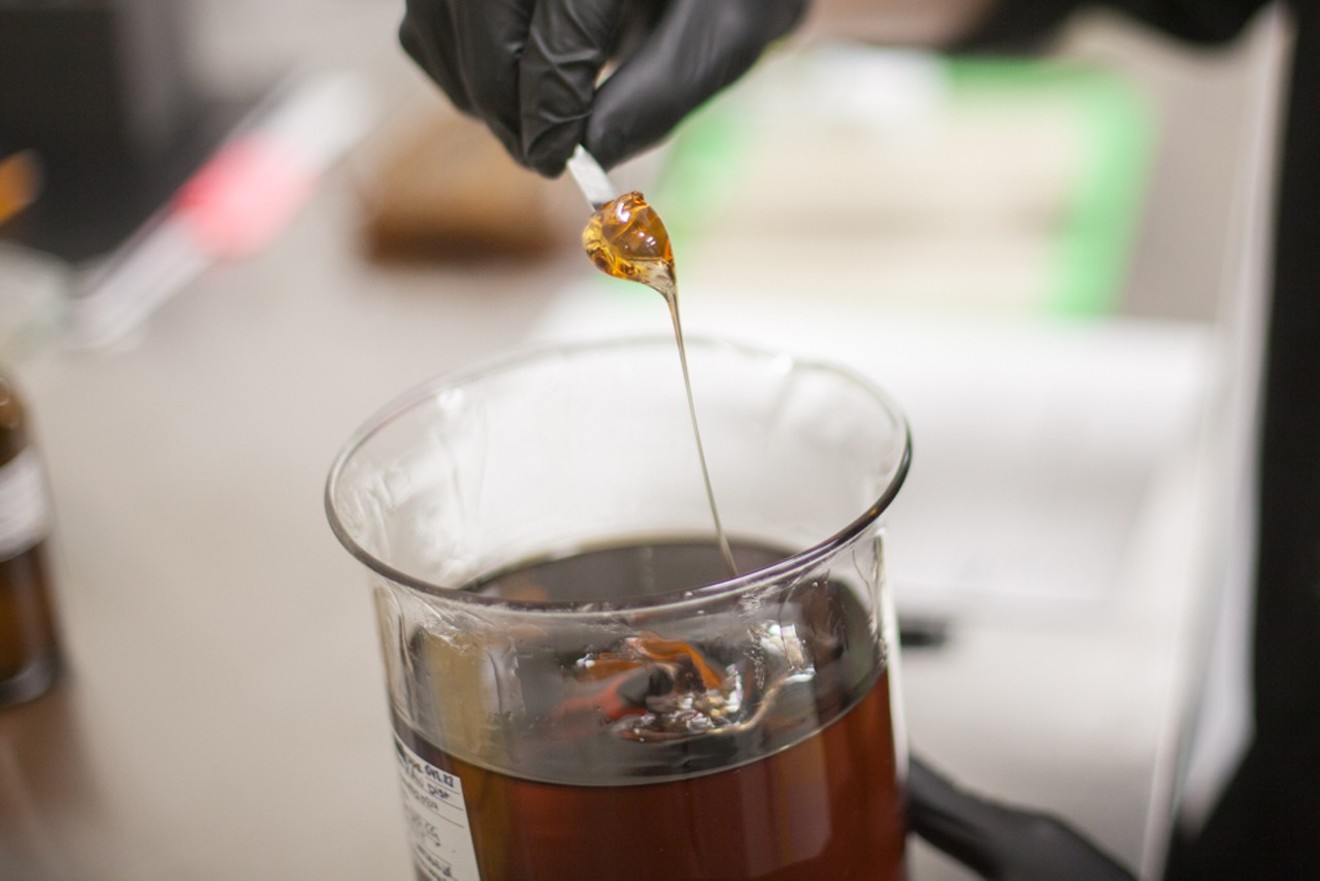Virtually all of the 180 active clinical studies in the country are researching marijuana's potential medical benefits or health effects, such as how cannabinoids treat HIV-related neuropathic pain. Others are less serious, like the Battelle Memorial Institute's upcoming study, "Laboratory Smoking of Marijuana Blunts," which compares different flavored tobacco papers' product appeal and abuse liability...by having subjects smoke blunts.
It's important to note that a clinical study listed by the NLM doesn't mean the federal government has evaluated or approved the study's validity; the NLM places the responsibility of a study's validity on the researchers and sponsors. Still, at least 68 current clinical studies about the cannabis plant are sponsored by the feds — the same government that lists marijuana as a Schedule I drug, or a substance with no medical value.
What makes clinical studies special? Although they can be sponsored by private interests, clinical studies involve several test phases, participants and independent reviews to determine a substance's medical value or health effects. Commonly viewed as a rare occurrence because of federal prohibition, clinical studies about marijuana provide essential information for future laws and regulations surrounding medical and recreational use.
Colorado has sixteen active or future clinical marijuana studies, making it fourth highest in number of studies behind Connecticut (35), California (23) and New York (23). The majority of the studies in Colorado involved institutions such as the University of Colorado and Children's Hospital Colorado and are researching marijuana's effects on breast milk, cancer patients, chronic pain, Parkinson's and other ailments. Find more information on those clinical studies below.
Colorado Marijuana Users Health Cohort
Summary: Information obtained during this study may identify new markers that influence the development of lung diseases such as chronic obstructive pulmonary disease. The Investigators are also interested in learning more about how marijuana affects sleep and insomnia.
Duration of Marijuana Concentration in Breast Milk: A Pilot Study
Summary: Legalization has led to a perception of its safety, even though it's not been thoroughly studied in pregnant or lactating women. The psychoactive component of marijuana, delta-9-tetrahydrocannabinol (THC), is lipophilic and therefore presumed to be secreted into breast milk. Additionally, it is unknown how the different modes of consumption (ie. smoked vs. edible) affects THC concentration in breast milk. The purpose of this small pilot study is to track THC expression in breast milk among women who have evidence of THC exposure at the time of labor and delivery or within 72 hours of delivery. The researchers hypothesize that women who have THC in their urine within 72 hours of delivery may excrete THC in breast milk for a predicted period of time.
Pain Research: Innovative Strategies With Marijuana (PRISM)
Summary: This study tests the effects of cannabinoid levels in blood on pain relief, inflammation and cognitive dysfunction in chronic-pain patients who use edible cannabis. Over a two-week period, participants use an edible product of their choice. Blood levels of 9-delta-tetrahydrocannabinol (THC) and cannabidiol (CBD) will be measured before, during and after the two-week exposure period to determine whether there are associations with pain, inflammation, sleep, physical activity, anxiety/depression and cognitive dysfunction. After the two-week period, participants will be followed for six months to collect data on cannabis use, pain levels, sleep quality and mental health symptoms.
Cannabis Versus Oxycodone for Pain Relief
Summary: This study investigates the ability of cannabis to reduce chronic back and neck pain and to reduce sensitivity to an acute painful stimulus. Cannabis will be compared to both oxycodone and a placebo.
Chronic Cannabis Smoking, Oxidative Stress and the Pulmonary Innate Immune Response
Summary: This study plans to evaluate the effects of chronic cannabis smoking on lung health by evaluating its effects on pulmonary health, lung physiology and alveolar macrophage function.
The Influence of In Utero Cannabis Exposure on Neonatal Brain Morphology and Structural Connectivity Summary: Cannabis is the most commonly used drug by women during pregnancy; about 5.7 percent use it in Colorado. This pilot study will collect preliminary data on the impact of in-utero cannabis exposure to the brain.

Medical marijuana will soon be a legal alternative to opioids in Colorado.
iStock/UrosPoteko
Summary: This project asks current cannabis users to stop using their typical product and to use cannabis containing different ratios of the cannabinoids THC and CBD. Then participants complete assessments including cognitive tasks, clinical measures, substance use history and blood draw.
Cannabis Use in Cancer Patients
Summary: The goal of this study is to determine the feasibility of orally administered cannabis among lung cancer patients.
Medical Marijuana in the Pediatric Central Nervous System Tumor Population
Summary: This study will evaluate children with tumors who self-medicate with marijuana-derived products as they undergo treatment at Children's Hospital Colorado.
The Use of Medicinal Cannabinoids as Adjunctive Treatment for Medically Refractory Epilepsy
Summary: The objective of this study is to determine how the use of medicinal cannabinoids affects children with epilepsy.
Anxiety, Inflammation, and Stress
Summary: This study investigates how CBD and THC affect anxiety, inflammation and stress.
A Study of Tolerability and Efficacy of Cannabidiol on Motor Symptoms in Parkinson's Disease Summary: The major purpose of this study is to assess how CBD impacts motor symptoms of Parkinson's Disease.
Treatment of Adolescent Antimuscarinic (Anticholinergic) Toxidrome (TAAT)
Summary: The investigators propose a randomized clinical trial of physostigmine compared to benzodiazepine for antimuscarinic toxicity.
Regional Radiotherapy in Biomarker Low Risk Node Positive Breast Cancer (TAILOR RT)
Summary: Researchers want to see if not administering regional radiation therapy works as well at preventing low-risk breast cancer from coming back.
Maintenance Chemotherapy With or Without Local Consolidative Therapy in Treating Patients With Stage IV Non-small Cell Lung Cancer
Summary: This randomized phase II/III trial studies how well giving maintenance chemotherapy with or without local consolidation therapy works in treating patients with stage IV non-small cell lung cancer.
Cerebrotendinous Xanthomatosis (CTX) Prevalence Study
Summary: This is an observational study to determine the prevalence of Cerebrotendinous Xanthomatosis (CTX) in patient populations diagnosed with early-onset idiopathic bilateral cataracts.












